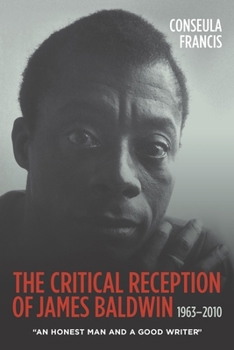The Critical Reception of James Baldwin, 1963-2010: An Honest Man and a Good Writer
(Part of the Literary Criticism in Perspective Series)
Select Format
Select Condition 
Book Overview
Examines the major divisions in criticism of this major African American writer, paying particular attention to the way each critical period defines Baldwin and his work for its own purposes. James Baldwin is a widely taught and anthologized author. His short story "Sonny's Blues" remains a perennial favorite in literature anthologies, and all of his essay collections and novels are still in print. His first essay collection, Notes of a Native Son, is a seminal work that led a new generation of African American writers from beneath the shadow of Richard Wright. The Fire Next Time is widely held as one of the most profound and accurate articulations of black consciousness during the Civil Rights movement. It is difficult to imagine teaching a survey of African American literature or considering the development of black intellectual thought in the twentiethcentury without mentioning Baldwin.
For more than half a century, readers and critics alike have agreed that Baldwin is a major African American writer. What they do not agree on is why. Because of his artistic and intellectual complexity, his work resists easy categorization, and Baldwin scholarship, consequently, spans the critical horizon. Conseula Francis's book examines the major divisions in Baldwin criticism, paying particular attention to theway each critical period defines Baldwin and his work for its own purposes. Conseula Francis is Professor of English and Associate Provost for Curriculum and Institutional Resources at the College of Charleston.
For more than half a century, readers and critics alike have agreed that Baldwin is a major African American writer. What they do not agree on is why. Because of his artistic and intellectual complexity, his work resists easy categorization, and Baldwin scholarship, consequently, spans the critical horizon. Conseula Francis's book examines the major divisions in Baldwin criticism, paying particular attention to theway each critical period defines Baldwin and his work for its own purposes. Conseula Francis is Professor of English and Associate Provost for Curriculum and Institutional Resources at the College of Charleston.
Format:Paperback
Language:English
ISBN:1571139680
ISBN13:9781571139689
Release Date:April 2016
Publisher:Camden House (NY)
Length:174 Pages
Weight:0.58 lbs.
Dimensions:0.4" x 6.0" x 9.0"
Customer Reviews
0 rating





